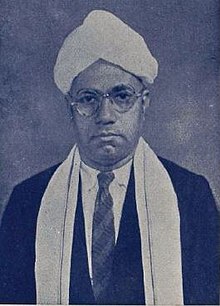S. Vaiyapuri Pillai
S. Vaiyapuri Pillai | |
|---|---|
 Vaiyapuri Pillai in 1936 | |
| Born | 12 October 1891 |
| Died | 17 February 1956(aged 64) |
| Nationality | Indian |
| Occupation(s) | Lawyer, publisher |
| Known for | Tamil Scholar, publisher |
Rao SahibSaravanapperumal Vaiyapuri Pillai(12 October 1891 – 17 February 1956)[1]was a renowned lawyer andTamilscholar. An advocate by profession, he edited and published several Tamil classics from original manuscripts. He is best remembered as the editor of theTamil lexiconpublished by theMadras Universityin the 1920s. He was a voracious reader and had in his own private collection thousands of books in Tamil,English,SanskritandMalayalam.His collection also included hundreds ofpalm-leaf manuscripts.This collection was later donated to theNational Library of IndiainKolkata. .
Early life and education
[edit]Vaiyapuri Pillai was born in 1891 to Saravanapperumal Pillai and Pappammal in aSaiva Vellalarfamily ofTinnevely District.After graduating in 1912, he studied law and practised as a lawyer inTrivandrumand Tinnevely from 1915 to 1926.
Editor of the Tamil lexicon
[edit]On November 25, 1926, Pillai was appointed editor of the Tamil lexicon committee of theMadras University.Until then, Voume I of the lexicon and the first part of Volume II had been published over a span of fourteen years. But once Pillai took over, the remainder of the lexicon which comprised six volumes was completed in just ten years.
Later years
[edit]From 1951 to 1954, Pillai served as Honorary Professor of Tamil at theUniversity of Travancorein Trivandrum. Retiring in 1954, he returned to Madras city where he died on 17 February 1956.
Controversies
[edit]In June 1940, the government ofMadras Stateappointed a committee headed byV. S. Srinivasa Sastrito frame general principles for coining words for scientific and technical terms in Tamil. The constitution of the committee was opposed by Tamil purists who felt that Sastri was strongly anti-Tamil. Sastri precipitated matters further by recommending the inclusion of Vaiyapuri Pillai, who was also perceived to be anti-Tamil. The committee eventually recommended the retention of words of English and Sanskrit origin. Vaiyapuri justified the decision as a necessity for promoting national integration and cited the poetry ofManonmaniam Sundaram Pillai.The decisions of the committee were opposed tooth and nail by activists of theMadras PresidencyTamil Sangamand were eventually reversed after Sastri's death in 1946.
Literary works Nationalised
[edit]In February 2009, theTamil Nadustate government announced that the works of 28 scholars would be nationalised and the literary critic, Vaiyapuri Pillai's works were among them. In his budget address, finance ministerK. Anbazhagansaid compensation would be paid to the legal heirs of the authors having regard to the number of books written by them, their social impact and literary value. With a view to ensuring that the views and thoughts of great Tamil savants who dedicated their lives to the language benefitted the present and future generations, the government implemented the nationalization scheme.[2]
See also
[edit]References
[edit]- ^"Vaiyapuri Pillai Passes Away".The Indian Express.18 February 1956. p. 3.
- ^The Times of India: Literary works of 28 Tamil writers to be nationalised
External links
[edit]- "Vaiyapuri Pillai Collection".Archived fromthe originalon 21 March 2007.Retrieved18 April2007.
